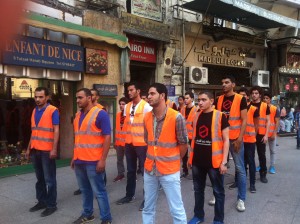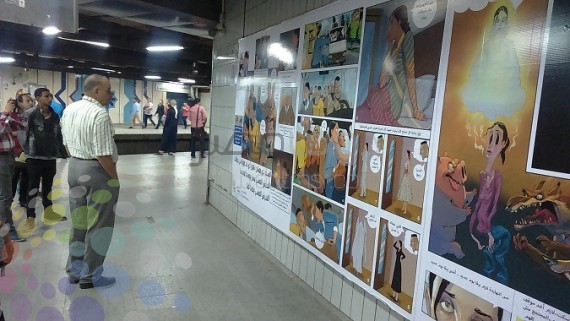Nov. 25 – Dec. 10 are the 16 Days of Activism Against Gender-Based Violence. To commemorate the week, we are featuring 1 activism idea per day. This information is excerpted from my new book Stop Global Street Harassment: Growing Activism Around the World (Praeger 2015).
At various times and places, a spate of well-publicized attacks on women in public spaces has inspired people to set up patrols or volunteer escort services. In recent years, this happened in Norway, the United States, and Egypt.
In 2011, after reading about men raping several young women who were walking home at night in Oslo, Norway, four young women in their early 20s formed Action Against Rape (AAR) and decided they would patrol the city after dark to help make the environment safer. The first weekend they went out, around 200 people joined them. During the next year, AAR organized patrol groups of 4–6 people every Friday and Saturday night from 10 p.m. to 3 a.m. Wearing yellow vests, they fanned out across the city. They rarely encountered harassers, but AAR co-founder Lisa Arntzen felt their very presence deterred harassment and violence. “I was 21 and didn’t have the power to make the big changes, so this was something easy I could do,” Arntzen told me. “That’s why so many people joined us. They realized they could contribute and it wasn’t hard at all.”
Similarly, in response to numerous sexual assaults of women in Brooklyn, New York, American bike messenger Jay Ruiz reacted by starting the Brooklyn Bike Patrol in 2011. He recruited 10 volunteers, and they began escorting women home from five neighborhood subway stops from 8 p.m. until midnight most nights. People could simply call them to request an escort. Within weeks, they expanded their volunteer base and service area. Wearing florescent-yellow T-shirts, the volunteers continue to receive up to a dozen calls each night.
 Because many men in Egypt take advantage of crowds at protests and holidays to harass, grope, and commit gang assaults against women, activism groups set up patrols during these times in 2012. Wearing bright-yellow vests, they look for harassment situations and break them up. They also publicize a phone number people can call if they need help. For example, in 2012 during Eid-ul-Fitr, the holiday at the end of the Islamic holy month of Ramadan, volunteers with Bassma (Imprint) interrupted many instances of harassment and helped police arrest several harassers each day. Founder Nihal Zaghloul wrote for the SSH blog, “It is OUR RIGHT as women to walk in the streets safely, and [since] NO ONE will give us this right, we must take it ourselves.”
Because many men in Egypt take advantage of crowds at protests and holidays to harass, grope, and commit gang assaults against women, activism groups set up patrols during these times in 2012. Wearing bright-yellow vests, they look for harassment situations and break them up. They also publicize a phone number people can call if they need help. For example, in 2012 during Eid-ul-Fitr, the holiday at the end of the Islamic holy month of Ramadan, volunteers with Bassma (Imprint) interrupted many instances of harassment and helped police arrest several harassers each day. Founder Nihal Zaghloul wrote for the SSH blog, “It is OUR RIGHT as women to walk in the streets safely, and [since] NO ONE will give us this right, we must take it ourselves.”
Similarly, during political protests, as many as 300 volunteers with groups like Operation Anti-Sexual Harassment wear shirts proclaiming Tahrir Square a “safe square for all” while standing at every checkpoint, atop watchtowers, and throughout the crowd. They pass out hotline numbers and instructions on handling rape trauma victims. After one of their patrols in December 2012, Yasmine Abdelhamid said it was the first time since the uprising that she felt it was safe for her to protest in Tahrir Square.
Help fund our work in 2016, donate to our end-of-year giving campaign!







